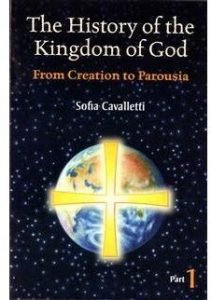How do we introduce Christ the King in the atrium?
The method we use with the little children in the Catechesis of the Good Shepherd is to wonder about what God is telling us in his word and to look at signs and symbols for their hidden secrets.
Pope Pius XI established the Feast of Christ the King in 1925. The Pope wrote about his reasons for instituting this feast day in his encyclical, Quas Primas[i]. Some of the things he refers to seem to be echoed in the things we face today in a world that is rapidly turning to serving themselves and away from Christ.
A King implies there is a Kingdom. We learn about his kingdom through the parables. Jesus reveals to us the secrets of the kingdom of God but in a way where we have to pon der and seek. The kingdom of God is like a mustard seed[ii], it is like a precious pearl[iii], like a treasure hidden in a field[iv], like yeast in bread[v]. How do these parables help us to understand what God’s kingdom is like? It is a mystery we can ponder for a long time. Something so small that grows to something so big. Something so precious that we look all of our lives to find it, or perhaps stumble across it when we are on our way to do other things. What is God’s kingdom? During advent we meditate on in the atrium is about the one who is to come. One who will rule:
der and seek. The kingdom of God is like a mustard seed[ii], it is like a precious pearl[iii], like a treasure hidden in a field[iv], like yeast in bread[v]. How do these parables help us to understand what God’s kingdom is like? It is a mystery we can ponder for a long time. Something so small that grows to something so big. Something so precious that we look all of our lives to find it, or perhaps stumble across it when we are on our way to do other things. What is God’s kingdom? During advent we meditate on in the atrium is about the one who is to come. One who will rule:
I see him, but not now; I behold him, but not near; A star shall come forth from Jacob, A scepter shall rise from Israel [vi]
One who will have powerful names:
For a child will be born to us, a son will be given to us; And the government will rest on His shoulders; And His name will be called Wonderful Counselor, Mighty God, Eternal Father, Prince of Peace[vii].
With some of the older children we meditate on our role in the kingdom. We ask questions of ourselves. How can I bring his kingdom closer? What can I do today? How do I live and continue to bring about God’s Plan of bringing all people to life in his kingdom? Each time we pray the Our Father we say the words:
“Thy kingdom come, Thy will be done[viii]”.
Are we aware of what we are asking for? Is it something we truly embrace? It makes me reflect on my own life. Am I continuing the help God’s kingdom to come now, here, in my everyday thoughts and action? Am I longing  for Parousia when God will be all in all[ix] and his kingdom will have no end[x]? Sofia Cavalletti in her book The History of God From Creation to Parousia[xi] says
for Parousia when God will be all in all[ix] and his kingdom will have no end[x]? Sofia Cavalletti in her book The History of God From Creation to Parousia[xi] says
“Thus, the history continues straining toward a hope: the salvation of all people and the expansion of the covenant to the “ends of the earth,” when the saved person will carry with him or her the entire universe, “which has been groaning in labor pains until now” (Romans 8:22). Indeed, the redemption of the universe is connected to human redemption. Just as the earth was cursed because of humankind’s sin, so, too, it will be restored and redeemed by the influence – positive this time – that redeemed human beings exercise upon it[xii]. Thus, all things will be recapitulated in Christ, who will reinstate the kingdom of God, and his kingdom will have no end.”
____________________________________________________________________________________________________
- [i] http://w2.vatican.va/content/pius-xi/en/encyclicals/documents/hf_p-xi_enc_11121925_quas-primas.html
- [ii] Matthew 13:31
- [iii] Matthew 13:45
- [iv] Matthew 13:44
- [v] Matthew 13:33
- [vi] Numbers 24:17
- [vii] Isaiah 9:6
- [viii] Matthew 6:10
- [ix] 1 Corinthinans 15:28
- [x] Luke 1:33
- [xi] Cavalletti, S, The History of the Kingdom of God Part 2 From Creation to Parousia. Liturgy Training Publications, Chicago IL, 2012, page 185.
- [xii] Lyonnet, S, La storia della salvezza nella Lettera ai Romani, Napoli, 1966, page 221.